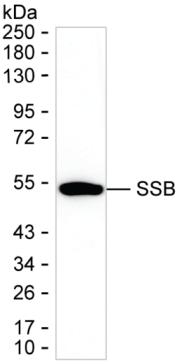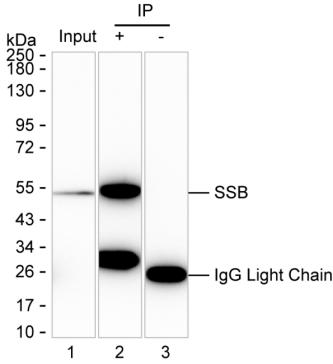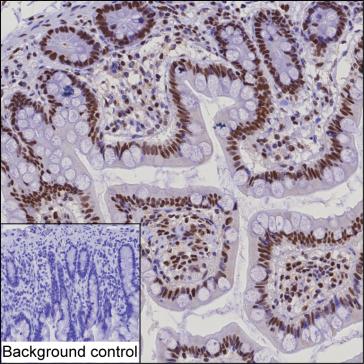


| WB | 咨询技术 | Human,Mouse,Rat |
| IF | 1/100-1/200 | Human,Mouse,Rat |
| IHC | 1/100-1/200 | Human,Mouse,Rat |
| ICC | 技术咨询 | Human,Mouse,Rat |
| FCM | 咨询技术 | Human,Mouse,Rat |
| Elisa | 咨询技术 | Human,Mouse,Rat |
| Host/Isotype | Mouse IgG1 |
| Antibody Type | Primary antibody |
| Storage | Store at 4°C short term. Aliquot and store at -20°C long term. Avoid freeze/thaw cycles. |
| Species Reactivity | Human |
| Immunogen | Purified recombinant fragment of human SSB |
| Formulation | Purified antibody in PBS with 0.05% sodium azide |
+ +
1. **"Autoantibodies to small nuclear ribonucleoproteins in Sjögren's syndrome" by E.M. Tan et al.**
该研究首次系统描述了SSB(抗La)抗体在干燥综合征中的特异性,指出其与腺体损伤及口干眼干症状的相关性,并强调其与抗Ro抗体的共现率高达70%。
2. **"Neonatal lupus syndromes: Clinical and molecular insights" by J.P. Buyon et al.**
文章探讨了母体SSB抗体经胎盘传递导致新生儿狼疮的机制,重点分析其与先天性心脏传导阻滞的关联,并提出抗体滴度监测对妊娠管理的意义。
3. **"Molecular characterization of the La/SSB autoantigen" by M.R. Lerner et al.**
该文献解析了SSB抗原的RNA结合蛋白特性,阐明其参与RNA代谢的分子机制,并揭示其表位区域如何触发自身抗体反应。
4. **"Diagnostic criteria for Sjögren's syndrome: A critical review"由国际干燥综合征共识组发表**
提出SSB抗体作为干燥综合征核心血清学标志物,纳入2016年ACR/EULAR分类标准,强调其对疾病诊断及亚型分层的价值。
SSB antibodies, also called anti-La antibodies, are autoantibodies targeting the SSB (Sjögren’s syndrome antigen B) protein, a 48-kDa phosphoprotein associated with RNA molecules. These antibodies are primarily linked to autoimmune disorders, particularly Sjögren’s syndrome (SS) and systemic lupus erythematosus (SLE). SSB antibodies often coexist with SSA (Ro) antibodies, forming a complex involved in RNA processing, including the maturation of RNA polymerase III transcripts. Their presence is detected via immunoassays like ELISA or immunoblotting and serves as a diagnostic biomarker.
In Sjögren’s syndrome, SSB antibodies are associated with more severe glandular dysfunction and extraglandular manifestations, such as vasculitis or renal involvement. While SSB antibodies are less common than SSA antibodies, their specificity for SS is higher, especially when both antibodies are present. In SLE, they correlate with photosensitivity, neonatal lupus, and congenital heart block in infants born to mothers with these antibodies. The pathogenic role of SSB antibodies remains unclear, though they may contribute to autoimmune responses by disrupting RNA-protein interactions or promoting apoptosis.
Research suggests genetic factors, particularly HLA-DR3 haplotypes, influence SSB antibody production. Despite their diagnostic utility, SSB antibodies are not exclusive to autoimmune diseases and can occur in other conditions, necessitating clinical correlation. Their detection aids in subclassifying autoimmune disorders and guiding prognostic evaluations.
×